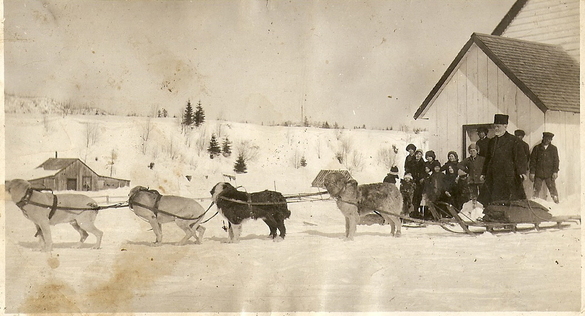Like all citizens of Northern Algoma, Wawa residents live in a remote and scenic corner of Northern Ontario. We know that our dues for being lucky enough to call this our home, is to endure suffocating black flies, blinding lake effect snow squalls, hungry black bears and curious wolves.
During the severely cold winter of 1910-11, residents of Wawa (both human and canine), were desperate for meat. A load of frozen beef hauled by horse and sleigh on the Grasset Trail between Missinabi and Wawa was trailed by a hungry pack of wolves for several miles. One by one, quarters of beef were shoved off the sleigh and sacrificed to the wild dogs in order for the driver and horse to gain a mile or two before the pack reappeared to resume their next course. Every morsel of meat gone, the driver feared that his horse would be next on the menu before reaching the safety of the Helen Mine camp near Wawa.
The sacrificed meat was originally destined to feed the 200+ hungry iron miners and their families. The only other available meat in the vicinity was a small heard of caribou that wintered between Wawa and Michipicoten Harbour. With permission from the Dominion Government, desperate residents dispatched the entire herd.
Wolves were a concern again during the winter of 1924-25. The Sault Star headline for November 22, 1924 read “Joe Ball, of Michipicoten, With Clothes Torn Off, Won Desperate Battle with Wolf Which Attacked Him – Hobbled by a snowshoe and unarmed he strangled the wolf with a piece of trappers’ cord. Beat off three others with snowshoe he was able to remove from his right foot.” (The Sault Star, 22Nov1924)
During the lean years of World War I, many citizens began raising their own live stock for food. Alex Ross, a long-time resident on Broadway Avenue had to dispatch the largest wolf he had ever encountered in order to save one of his prize pigs. “Skinned, the pelt was over 7 feet long, the biggest wolf I ever seen and the only one I ever got during my long years up here and he had to come right into my back yard and ask to be shot.” (The Sault Star, 4Jul1935) Mr. Ross’s sow had both ears chewed off and became a local curiosity for Wawa residents and visitors alike.
In 1935, a Sault Star correspondent postulated the theory that the rise in daring wolf attacks in the Wawa area was due to the cross-breeding of timber wolves and domesticated dogs. At the turn of the 20th Century, hardy sled dogs were a valuable addition to the winter work force at the bustling Michipicoten Harbour and railway operations. With the collapse of the Clergue empire in 1903, the 28 dogs were “turned loose, and soon became wilder than the worst wolves and hunting in a pack, old timers say, [giving] rise to the stories of parties being trailed by hungry wolves …These dogs, in time, crossed with the wolves and gave rise to a large variety of timber wolf.” (The Sault Star, 26Feb1934)
Advice for us from Joe Ball in 1924 after a pack of young wolves attacked him: “A wolf is always hungry and is never hungry. By which he means that he can defer eating till another day if he wishes to…Young wolves are notoriously venturesome like young dogs. Anyone acquainted with young dogs knows how irresponsible they are…and it may be agreed that a young wolf has no more sense than a young dog…Mr. Ball has no fear of a wolf. But he thinks no one should be foolhardy.” (The Sault Star, 22Nov1924)
Wawa vs. wolves will continue to be a story of respect for our nature and our heritage.
--oOo--
To read the original 1924 Sault Star article on Joe Ball's harrowing fight with the wolves, go to my first blog "Wawa vs Wolves".

 RSS Feed
RSS Feed
